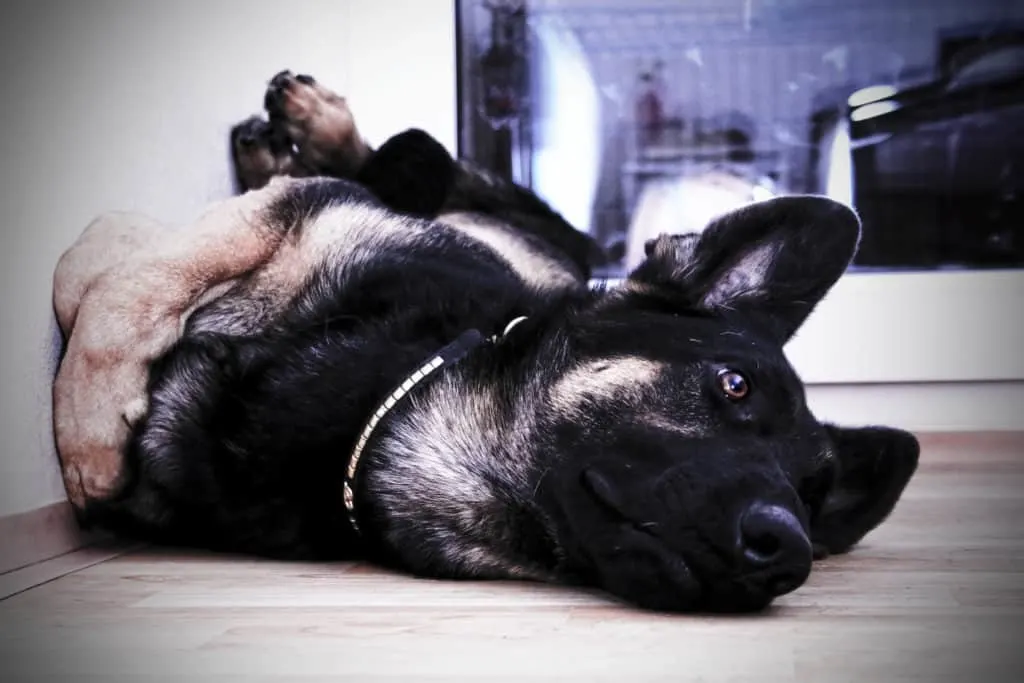
Having a German Shepherd in your life can be wonderful, but we can’t deny their occasional stench every now and then.
Even the most well-kept pups can have the occasional a run-in with foul odor. While some smelly issues have a quick fix, there are some issues that will require medical attention to resolve.
Click Here to Jump to a Section
Is It Normal for a German Shepherd to Smell?
Ideally, your dog should never have a pungent odor that’s noticeable within a room or when you’re in close proximity to your pup. If your dog requires frequent bathing in order to keep its scent manageable, then there is most likely an underlying medical issue that needs to be addressed.
It may seem strange that our dogs don’t need to freshen up each day, but they are actually designed against daily bathing.
Dogs have natural oils on their skin that should not be disturbed, and they lack the sweat glands that cause us to stink. Because of this, our dogs should never be bathed more than once a month.
So what are some reasons that your German Shepherd may have a pungent smell between baths?
In this article, we’ll discuss the possible reasons why your German Shepherd can smell, and what you can do to fix it!
Ear Infections
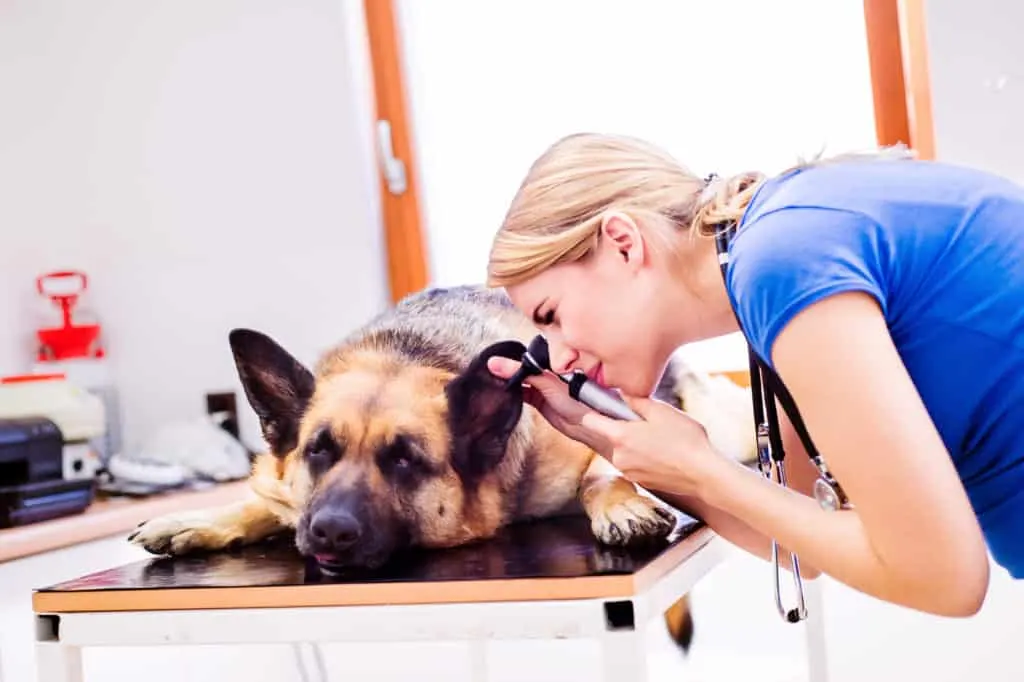
Does your German Shepherd have a strange yeasty smell? Do you often see her pawing at her ears or shaking her head?
If so, your Shepherd pup may be dealing with an ear infection. Ear infections can lead to a build-up of yeast and bacteria in the ear that can lead to a foul smell.
Our dog’s ears are the perfect environment for yeast and bacteria to thrive. Bacteria love dark and damp spaces, making the ear like an ideal place to brew.
Though a healthy dog should have defenses in their ears that are ready to fight off unwanted organisms, things can become unbalanced for a number of reasons.
Just like humans, dogs have a number of circumstances that can cause them to lack in their natural defenses against bacteria and illness. Some of these include:
- Allergies (food, environmental, or contact)
- Excess hair in the ears
- Excessive ear cleaning
- Frequent swimming
- Long or floppy ears
- Long term antibiotic use
- Weakened immune system
Ear infections are not only smelly, but can be extremely uncomfortable for your German Shepherd. If left untreated, the infection can worsen resulting in increased pain and the possibility of ear hematomas from head shaking.
If you fear that your dog is experiencing an ear infection, make sure to see your veterinarian for routine ear testing.
Your veterinarian can swab test your dog’s ear and check for any bacteria or yeast under the microscope. Together you can figure out a plan for long term management.
Skin Conditions
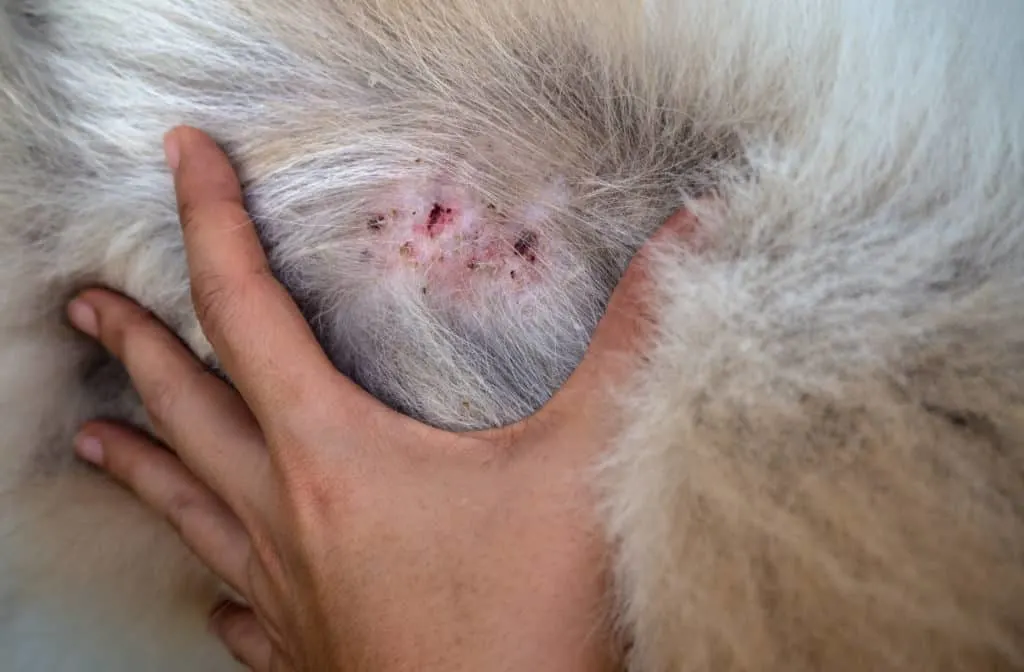
The skin does a marvelous job of protecting our dogs against bacteria and foreign material that can cause them harm, but what happens when the skin itself is compromised?
Since the skin covers your German Shepherd’s entire body, it’s no wonder the condition of the skin can result in such a pungent smell.
Just like in humans, dogs can experience a number of skin conditions that can affect their smell, overall health, and appearance.
The condition itself can cause a stench, but it’s the self-mutilation that often accompanies it which leads to a majority of the problems.
In almost all skin conditions that dogs face, one of the main symptoms is itching and discomfort of the skin.
Since dog’s don’t understand the repercussions of scratching their skin, they will scratch themselves to the point of sores and hotspots on the skin.
The skin problems and the sores will often result in a foul odor that can cause your Shepherd to have a noticeable smell.
Some skin conditions that can cause your German Shepherd to smell include:
- Dandruff
- Hot spots and sores
- Flea dermatitis
- Yeast on the skin
- Skin allergies
- Chronic skin conditions
- Skin mites
Each of these conditions can greatly affect the skin and lead to a number of concerning symptoms, including odor.
If you notice that your dog is itchy, has sores on the skin, patches of hair loss, dandruff, or any other concerning symptoms, it’s best to see your veterinarian for a plan of action.
Dental Disease
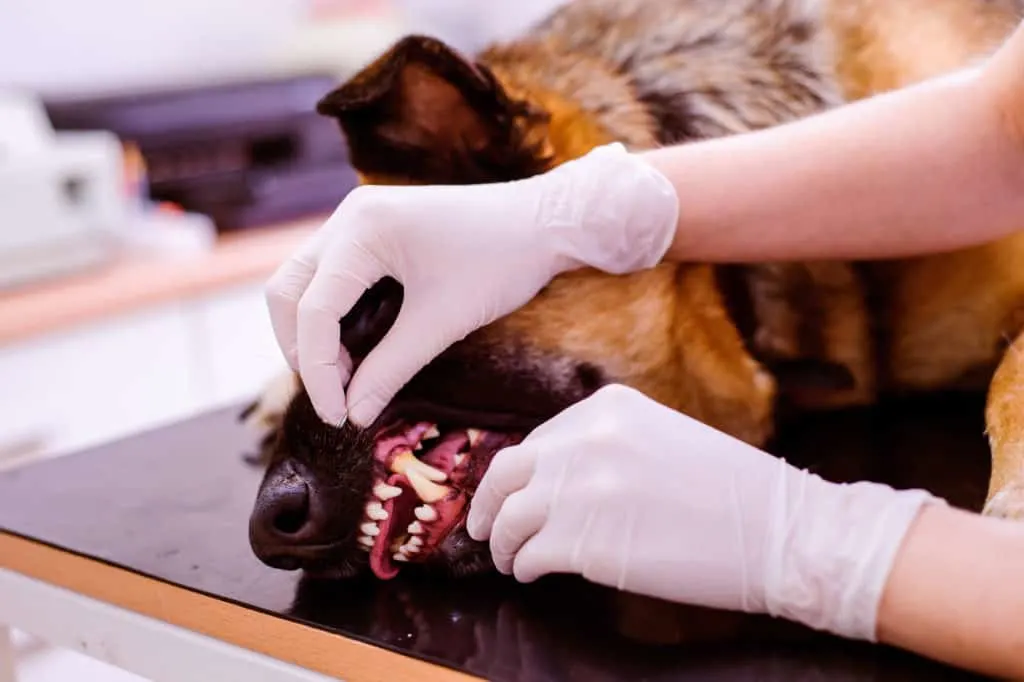
The buildup of plaque and tartar on your teeth can result in bad breath, and it’s no different for your German Shepherd.
Over the years your pup is bound to experience a build-up of material on their teeth due to their age, their diet, genetics, or lack of proper dental cleaning.
No matter the cause of the dental disease, it can result in a noticeable odor and extreme discomfort. Some signs of dental disease include:
- Foul breath
- Bleeding or red gums
- Discoloration of the teeth
- Difficulty eating or picking up food
- Blood on toys or in their water bowl
- Loose teeth
- Not wanting their head to be touched
- Facial swelling (in advanced stages of dental disease)
Dental disease is much more than a nuisance due to bad breath. Dental disease can result in severe pain, infections, and bacteria that can enter the bloodstream and affect other parts of the body.
In order to prevent odor and complications from dental disease, it’s best to speak with your vet about a proper dental cleaning routine.
Each dog will vary depending on their specific needs, so it;s best to speak with a professional about your options.
Things you can do for your dog’s dental health at home include providing daily dental chew treats, daily toothbrushing with dog-safe toothpaste, and offering hard kibble as a daily diet.
Anal Glands
You may not have heard of anal glands, but they are known for causing a pungent and distinct smell that comes from your dog’s behind.
You can’t miss the stench they produce, as they are well known for the strong fish-like odor they produce.
The anal glands hide in the muscles on a dog’s behind just under the tail. When working properly, they are excreted in small amounts with each bowel movement.
These glands are the reason why other dogs greet each other with a smell of their back end, as well as how dogs make their presence known when leaving stool behind in “the wild.”
When these anal sacs get “backed up,” this can result in a foul smell that is excreted from your Shepherd’s behind, or even around your house if they are scooting.
If your dog’s anal glands become obstructed, they can experience a great deal of pain along with an odor from the overflow of its contents.
Obstructed anal glands can also result in a painful abscess if not addressed, so it’s important to never ignore this smell if you notice it.
Though anal gland complications mostly affect small dogs, German Shepherd do, from time to time, also experience anal gland issues.
Symptoms of impacted anal glands include:
- Scooting their behind
- Licking their behind
- Blood in stool, or spots around your house where they frequently sit
- Discomfort when passing stool
- Strong fish-like odor
If you think that your German Shepherd may be experiencing complications from their anal glands, it’s best to see your veterinarian.
Your vet can easily check the size of their anal glands upon examination, and can empty them if necessary.
If there is evidence of difficulty expressing their anal glands your vet can arrange a set schedule to have them emptied to avoid complications.
Gas and GI Upset
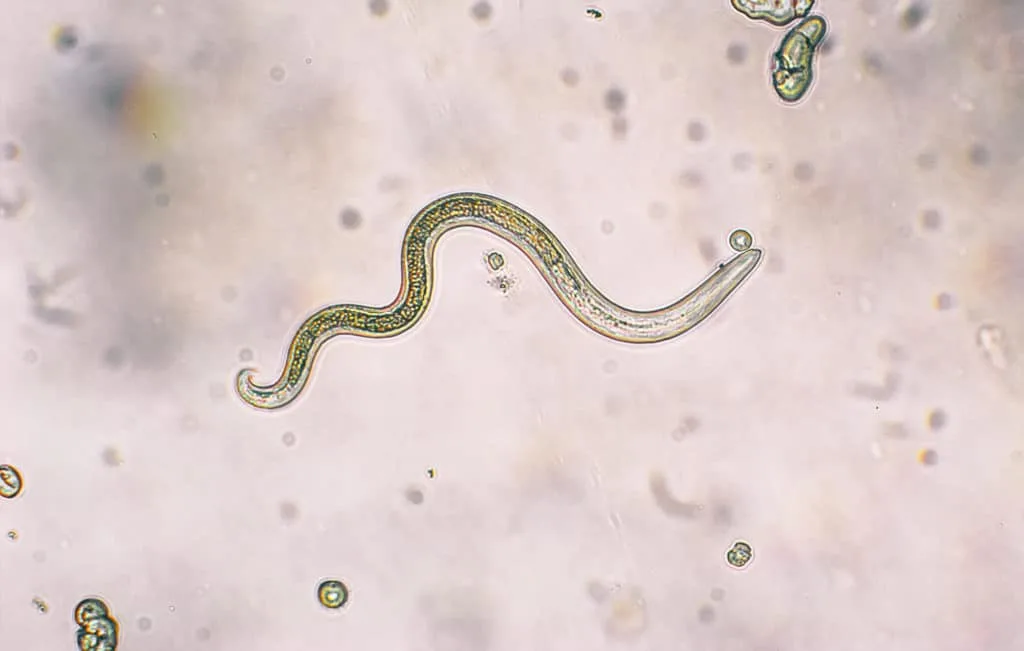
Even the healthiest pup is bound to experience gastrointestinal upset at some point in their life.
While this can be an occasional problem for some dogs, some may battle constant indigestion and GI upset that can result in gas.
While some flatulence is normal, if it seems like your German Shepherd is always gassy, there may be a bigger problem to address.
A dog’s gut has a system in place to help combat gastrointestinal upset, but these defenses can be disturbed by a number of scenarios.
Some reasons why your German Shepherd could be experiencing gas and Gi upset include:
- Improper diet or nutrition
- Change in diet
- Eating trash or something they shouldn’t have
- Intestinal parasites
- Bacterial imbalance
- Any other condition that can cause intestinal upset
If you think your dog is experiencing an abnormal amount of gas, or is having other gastrointestinal upset, it’s best to see your veterinarian before the symptoms progress.
Your veterinarian can help to rule out any medical conditions that could be a factor, or help to recommend a proper diet.
Getting Dirty Often
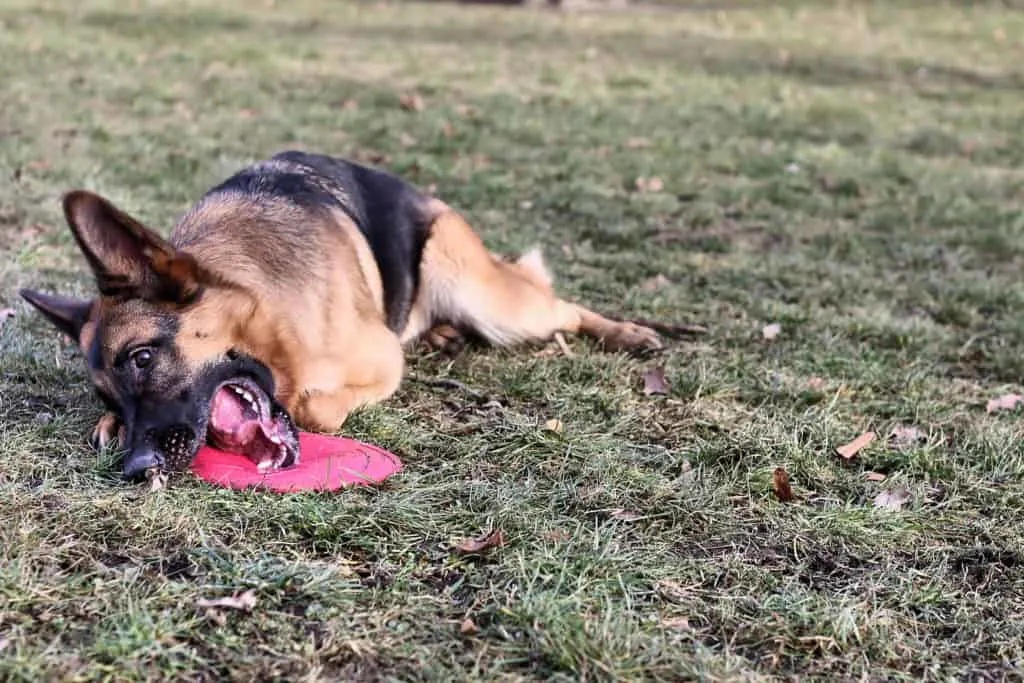
Some dogs play dirtier than others. While some pets like to spend their time lounging on the couch, others like to run around in the mud and soak in all the outdoor smells.
If this sounds like your dog, they may need a bath more often than others. Some outdoor activities that can result in a smelly dog include:
- Swimming, especially in lakes or other bodies of water
- Rolling around in the grass or dirt
- Playing often with other dogs
- Any type of water sport
- Outside work
- Hiking or other outdoor adventures they may accompany you on
Did Your German Shepherd Roll in Something?
Our German Shepherds come with a set of hardwired instincts that are passed down from their wild dog ancestors. One of these instincts include the need to roll in smelly things!

Whether its dead wildlife, animal stool, or smelly trash… your dog may feel the need to jump right in.
Many dog experts believe that this relates back to dogs’ need to mask their smell in the wild.
In an effort to make them less noticeable to their prey, some wild dogs will roll around in any pungent smelling objects to mask their scent for their hunting endeavors.
Wet Dog Smell
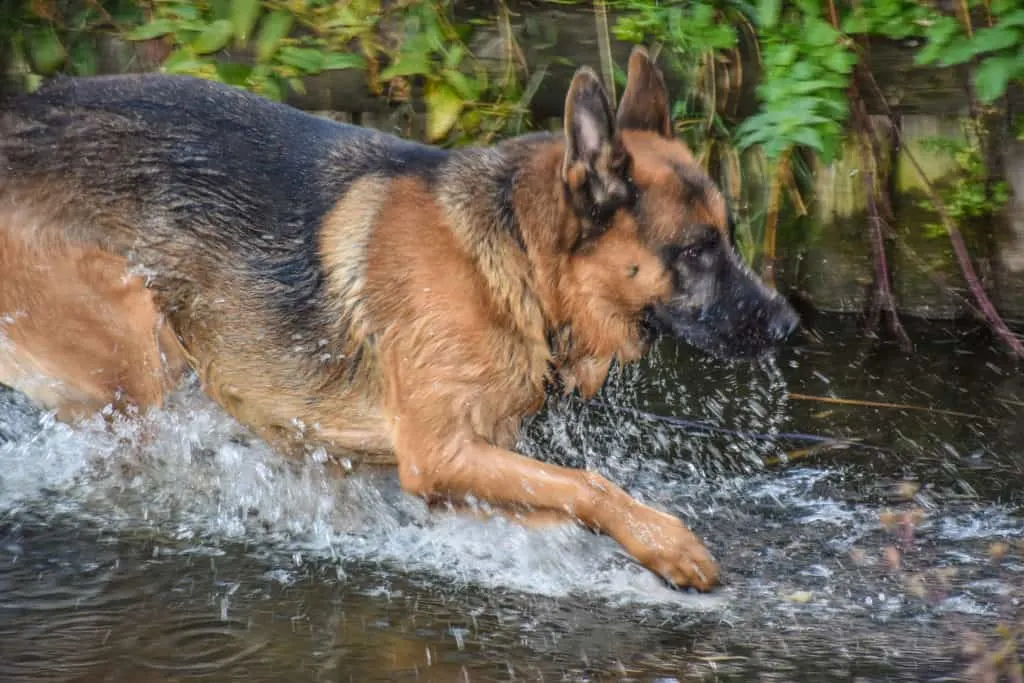
Does your dog smell just fine most of the time, but becomes pungent when he gets wet? This is actually completely normal.
A dog’s skin is filled with bacteria and yeast that help to protect against skin invaders. Once they become wet, the bacteria can release the characteristic wet dog smell.
As long as this smell disappears once your dog is dry, then it’s nothing to worry about.
Serious Medical Conditions That Can Cause a German Shepherd to Smell
Along with the not so serious reasons behind a smelly German Shepherd are the more involved reasons behind a stinky dog.
While these are not the most common conditions that may be the reason behind the odor coming from your dog, they are nonetheless conditions that you should be aware of.
Some serious medical conditions that can cause your German Shepherd to smell include:
- Kidney disease: The later stages of kidney disease in dogs is known to produce foul breath in dogs due to ulcers in the mouth. These ulcers are a result of the toxins that can build up in a dog’s system due to the disease.
- Masses: If your dog is prone to developing lumps and bumps, it’s possible for complications to arise that can cause these masses to smell.
- Diabetes: Some dogs with more serious conditions resulting from diabetes have been known to have a strong ammonia, sweet, or fruity smell coming from the mouth.
It’s also believed that only people with a certain strand of DNA can smell this fruity smell that comes from ketones due diabetic complications.
So if you can smell ketones on your dog, you are special. (And you should also contact your vet asap!) - Eye conditions: German Shepherds can experience several eye conditions that can cause a smell if left untreated. Some eye conditions present as eye discharge, swelling, and pain.
- Autoimmune skin conditions: Some autoimmune conditions of the skin can result in sores on the skin which can lead to abnormal odors coming from the skin.
While it is much more likely for your dog to experience a smell due to the less serious causes, it is not impossible for them to experience serious medical complications, especially as they age.
If your dog is experiencing any of the serious symptoms above, you should contact your vet ASAP.
When Should You Take Your Dog to See the Vet?
If your German Shepherd is ever putting off a foul odor that is not resolved with a bath, then it is best to visit your veterinarian to see if there is a medical reason behind the stench.
Most of the medical conditions listed above are fairly easy to treat when addressed early on, so it’s important to see your vet at the first sign of a persisting smell.
What Can You Do at Home Before You Visit the Vet?
If you need instant relief or answers behind your German Shepherds smell, there are a few things you can do at home. Your first lines of defense include:
- Bath time: The most obvious solution to your dog’s smell is a bath.
Dawn dish soap is a great option as it is known to eliminate tough odors, as well as kill all living fleas on your dog’s skin.
Since it can dry out a dog’s skin, Dawn should only be used in extremely stinky situations or with the presence of fleas. - Examine your dog’s skin: If your dog is noticeably smelly, make sure to examine their skin closely.
While you are looking them over you can help rule out any dry skin, fleas, ticks, hot spots, or any other concerning symptoms.
If you notice any dandruff or noticeably dry skin, try giving them a soothing bath with a shampoo made specifically for dry skin. - Dental chews and brushing: If you think your German Shepherd’s breath is the culprit in their stench, then it’s time to consider an at-home dental routine.
Consider daily toothbrushing with a dog-safe toothpaste as well as the addition of a daily dental chew. These options can help loosen tartar on the teeth and help to prevent the progression of dental disease. - Bland diet: If you think your dog is experiencing GI upset, try offering them a bland diet while you wait for your appointment with your veterinarian.
Plain unseasoned chicken breast and white rice is a bland option that won’t further upset your dog’s sensitive stomach, and is a safe alternative while you wait to see your veterinarian for further instructions.
Final Thoughts
There are several possible reasons behind your German Shepherd’s unknown stench.
While most causes of a smelly German Shepherd will be obvious and can be remedied with relative ease, some causes can originate from a not-so-obvious source, and may actually stem from an underlying medical issue.
So remember to act at the first sign of a strange smell and your GSD will be back on their way to his normal fresh scent!
